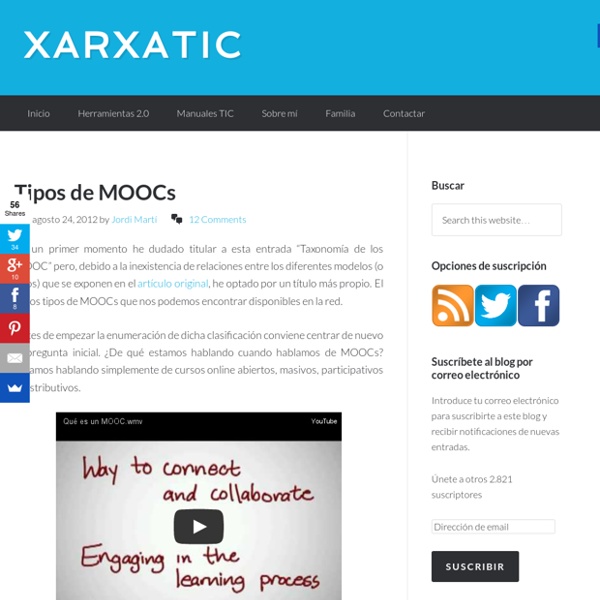Tipos de MOOCs

Los MOOC: orígenes, historia y tipos
Historia, definición, tipología y valoración de los Massive Open Online Courses (MOOC). Introducción En noviembre de 2012, el periódico The New York Times publicó el artículo "The Year of the MOOC"1 en el que se declaraba que el año 2012 había sido el año de los Massive Open Online Courses (MOOC) debido a la amplia atención que había recibido este nuevo término por parte de los medios de comunicación y la comunidad educativa mundial. Mucha gente piensa que los MOOC son la innovación tecnológica en educación más importante de los últimos 200 años2. Aunque los MOOC ya existían desde unos pocos años antes como una herramienta de aprendizaje colaborativo, su uso se limitaba a usuarios con un perfil muy concreto; sin embargo, el año 2012 ha sido el año en el que los MOOC han pasado a ser conocidos y usados por el "gran público". Breve historia Los orígenes El fenómeno MOOC está íntimamente ligado a otros dos fenómenos que han tenido lugar principalmente durante los últimos diez años: Tipos de MOOC
rgMOOC (RHETORIC AND GAME-BASED MOOC) (with images) · sherryjones
rgMOOC refers to "Rhetoric and Composition: The Persuasive Power of Video Games as Paratexts," a free and open online course that is game-based! Created by Sherry Jones and Kate Guthrie Caruso, this innovative and experimental course combines Advanced English Composition with Game Studies to give you the conceptual tools to mediate your gameplay experience, essentially helping you access the deeper rhetorical, social, and cultural meanings of digital games. Participants will also develop advanced writing skills by playing and writing about the paratextuality of digital games. If you are looking for a course that examines and analyzes digital games in-depth, then this is the course for you.
CCCC 2014 - “Composition on a New Scale: Game Studies and Massive Open Online Composition” by Sherry Jones and Daniel Singer | Sherry Jones
Jones and Singer 1 of 2 Copositio o a Ne “cale: Gae “tudies ad Massie Ope Olie Copositio Co-Authored and Co-Chaired by Sherry Jones (UCD and FRCC) and Daniel Singer (DU) AbstractThis paper takes up the arguments of Gee in Education, Bogost in Rhetoric and Philosophy, Colby and Colby,and others concerning the role of play and games in Composition pedagogy and extends them to re-approachthe problem of Massive Open Online Courses. The threat of the MOOC is ot siple teho -phobia but a conflation of the xMOOC model with the wholeof t he MOOC oeet. star istrutors are hired to reate ourses ad pedagogial materials as profitable, authoritative course-texts in their fields. represets the est ersio of the sae ourse uatio as a gidd atiipatio for the gleaig edelier odel of eduatio that ill arise fro the rule of the old Ior Toer ad that adoates for aaadeia that is ee ore oligarhi ad stratified tha it alread is (ephasis i the o
MOOCs: taxonomy of 8 types of MOOC
We're not payin' because this guy... ...this guy's a fuckin' mooc. But I didn't say nothin'. And we don't pay moocs. A mook? Yeah. What's a mooc? I don't know. You can't call me a mooc. I can't? No! Scorcese's Mean Streets (1973) What are MOOCs? “The future is already here, it’s just not very evenly distributed” said William Gibson, that is certainly true of MOOCs. Taxonomy based on pedagogy To this end, it is important to define a taxonomy of MOOCs not from the institutional but the pedagogic perspective, by their learning functionality, not by their origins. transferMOOCs madeMOOCs synchMOOCs asynchMOOCs adaptiveMOOCs groupMOOCs connectivistMOOCS miniMOOCSs 1. transferMOOCs Transfer MOOCs literally take existing courses and decant them into a MOOC platform, on the pedagogic assumption that they are teacher-led and many rely on a ‘name’ of the institution or academic to attract learners. 2. madeMOOCs 3. synchMOOCs 4. asynchMOOCs 5. adaptiveMOOCs 6. groupMOOCs 7. connectivistMOOCS 8. miniMOOCSs Conclusion
Related:
Related:




Se expone sobre los tipos de MOOCs que disponibles en la red, adaptando la clasificación sobre MOOCs que presenta Lisa M. Lane. Esta es una tipología basada en las diferentes experiencias que se están realizando por parte de diferentes educadores y centros educativos (normalmente de etapas superiores), que tiene que ver con la base sobre la cual se estructuran los mismos. Una base que va desde el aprendizaje distribuido en red, pasando por el basado en tareas hasta el más habitual en ámbitos reglados, el basado en contenidos; aunque todos los MOOCs, en mayor o menor medida, tienen incorporados los tres elementos (redes, tareas y contenidos). by ceciliatrincado Dec 16